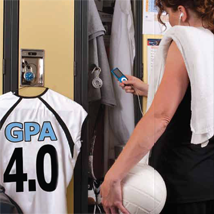When basketball players at Lethbridge College finish hitting three-pointers, they, like all Kodiaks athletes, hit the books.
Every Monday, regardless of their sport or their academic standing, some 120 young stars – and often, their coaches – can be found together in a study hall working on their courses.
The goal, says Athletics Director Mark Kosak, is to raise their marks and their scholastic success rate.
Kosak introduced the study hall concept as part of his mandate three semesters ago. When he took over the director’s position in August 2007, Kodiaks athletes were ranked second last of all schools in the Alberta Colleges Athletics Association.
That December, the department lost 20 athletes, or roughly one in five, due to academic ineligibility.
“Those are rather dubious statistics,” says Kosak. “The college administration felt academics needed to be a priority. Things have improved.”
Yes, they have. While Kosak does not yet have updated ACAC rankings, he can tell you Lethbridge College has the highest number of Academic All-Canadians, a club with one of the toughest membership requirements: a player must be declared an all-star at the provincial level while being ranked an honours student (GPA: 3.5 out of 4.0.)
Last season, Denver Corbiere, men’s basketball, made the grade (as did cross-country runners Christian Chesire, Douglas Mutai and Cassidy Qall.) Now an apprentice electrician with Midland Electric in Lethbridge, the six-foot-seven centre finished his two-year Kodiaks career at the top of his game and at the top of his class.
“We knew the previous players weren’t exactly known for their academics,” says Corbiere. “Coach (Mike) Hansen pushed us a lot to excel in class. Last year [2007-08] when we lost three guys mid-season to academic ineligibility, I think he felt he had failed them. This year [2008-09] with study hall strictly enforced, we lost no one; in fact, we gained a player who pulled up his marks and became a starter.”
In order to stay on a Kodiaks team, players must maintain a GPA of 1.5; to be eligible for any scholarships, they must score 2.0 or higher. In the fall of 2007, the average Kodiaks GPA was 2.41 and, as noted, in the ACAC cellar. After the first semester of mandated study halls in the winter of 2008, the figure had risen to 2.66; the following semester it hit 2.76. Only seven athletes, amid upwards of 60, were lost to academic disqualification.
While there was a modicum of initial grumbling about the study halls, especially among younger players directly out of high school, Kosak says those who initially resisted quickly came around once they saw the value of group study. Since then, the gatherings have helped foster a sense of family and a buy in by coaches who have had to sacrifice Monday practices.
Corbiere, who flashed through high school and three years of kinesiology at the University of Lethbridge, admits he groaned mildly when study hall became mandatory.
“I felt I could look after myself academically,” says the Rockglen, Sask., native. “But by the second year, I think the players understood what it was all about. The veterans stressed it to the younger players that they needed to keep up their grades; they were reprimanded if they missed.
“Our team had perfect attendance. We made sure our teammates were there. We wanted to be good ambassadors for the athletics program and the college. We developed a rivalry with the women’s basketball team.” Kodiaks Athletics honours those teams who record the highest GPA each semester; recently, the women’s volleyball team has made the award its own, rolling up a 3.30 GPA last semester.
Three of the nine Kodiaks teams had GPAs greater than 3.0; none made that grade in the dismal fall of 2007.
Kosak admits students who play for the Kodiaks shoulder a demanding load. Practices, weekend travel, fatigue and nerves before big games all take time and a toll on athletes. Still, the educational rewards of playing on highly competitive teams cannot be ignored, and include a unique nugget; his athletes, says Kosak, are among the best students on campus at time management.
Denver Corbiere: “It’s tough to balance work, school and basketball, but it’s definitely an honour when you do it right. I think Mark Kosak was a big reason for the turnaround. It can’t be just coaches doing the convincing. He personally talked to the players; we took it more seriously.”
Kodiaks are required to complete PED123 Academic Success, a course that, once a “gimme” just for making a team, now includes a lecture component on study skills, writing term papers and more, scheduled in the first semester of their time on campus.
“The reaction to PED123 has been unanimously positive,” says Kosak. “Parents and students love it. The highest attrition rate among students is in the first semester; this helps keep them in school.”
Players are also required to submit biweekly reports charting their academic progress. Instructors note their attendance and classroom performance, allowing for interventions before they face ineligibility.
Corbiere, a new father, hopes to be back on the Kodiaks bench this season, this time as an assistant coach. One doesn’t have to guess if he’ll be stressing classroom perfection along with good defence.
“The changes in Kodiaks Athletics proved the whole experience – can be positive. They’re building a great atmosphere there.”


